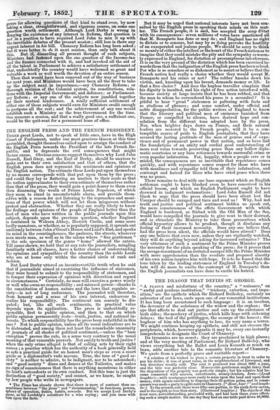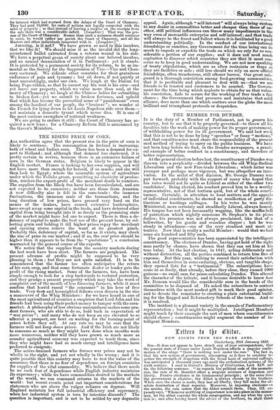THE DRAGON THAT DEFIES ST. GEORGE.
"A PIAGUE and misfortune of the country," a " nuisance," an " awful and perilous institution," "trickery, extortion, and impo- sition," are the epithets which Sir Richard Bulkeley, certainly no subverter of our laws, casts upon one of our venerated institutions. It has long been accustomed to such language : it is an incubus, the devourer of the substance of the widow and the orphan ; the ape that affects to deal out justice and eats up the substance of both sides ; the mockery of justice, which kills hope with sickening delays ; the tool of the pettifogger, the scourge of the honest ; the bugbear of him who has anything to lose, its very name a terror. We might continue heaping up epithets, and still not obscure the periphrasis, which, however gigantic it may be, every one instantly comprehends to designate the Court of Chancery. Its tyrannies are no secret; they are proclaimed in high places; and at the very meeting of Parliament, Sir Richard Bulkeley, who views everything but the Ballot and Louis Kossuth so much en bean, adds another tale to the romantic literature of Chancery. We quote from a perfectly grave and veritable report— "A relation of his wished to place a certain property in trust in order to pay his debts ; it was of great value, in the neighbourhood of Liverpool, and was therefore readily sold. The rent it produced was about 13001. a year, and the title was perfectly clear. Honourable gentlemen might fancy that the disposition of the property was perfectly simple ; but his relative had be- come connected with usurers, extortioners, money-lenders, Jews—(Loud laughter)—with mortgagees more ready to seize upon the land and upon their money, with agents unwilling to disgorge their ill-gotten gains, and in conse- quence was made a party to egiht suits in Chancery. ("Hear, hear!" and laugh- ter.) To the seventh suit there were fifty-one parties, to the sixth forty-seven, and to the eighth no less than sixty. (Continued laughter.) The objects of the trust were, notwithstanding, proceeded with, and had been three years effect- ing such a simple matter. On one day they had on one table paid down 40,0001. for interest which had accrued from the delays of the Court of Chancery. They had paid 10,000/. fpr costs of actions not legally connected with the sales of property ; so that instead of leaving a surplus on the receipts from the sale there was a considerable deficit. (Laughter.) That was the pro- cess of the Court of Chancery. Sooner than such a nuisance should continue to exist, he would rather say perish the Court of Chancery, and all the Masters and other individuals connected with it. (Laughter.)" Amusing, is it not? We have grown so used to this incubus, that we like it! We should miss it as the invalid did the long- accustomed bullet extracted from a veteran wound in his side. We have a perpetual groan of society about our beloved incubus, and an annual denunciation of it in Parliament : yet it stands. It is protected by a permanent society for its reform, to be as im- mortal as the Society for the Suppression of Vice—Vice and Chan- cery coeternaL We ridicule other countries for their gratuitous endurance of pain and tyranny ; but sit down, if not quietly at least unresistingly, under our own. We laugh at the Italian for being Pope-ridden, so that he cannot say his soul is his own—and yet leave our property, which we value more than soul, at the mercy of Chancery; we laugh at the Chinese ladies for submi •
to broken feet—yet we submit to broken fortunes, and uphold that which has become the proverbial acme of " punishment" even among the hardiest of our people, the " bruisers ' ; we wonder at the French for lying down to let Louis Napoleon ride over them— yet maintain a domestic tyrant which never dies. It is one of the most curious exemplars of national weakness. We are going to endure it still : the Court of Chancery has ac- quired a new lease ; for a Chancery Reform Bill is announced by the Queen's Ministers.



























 Previous page
Previous page